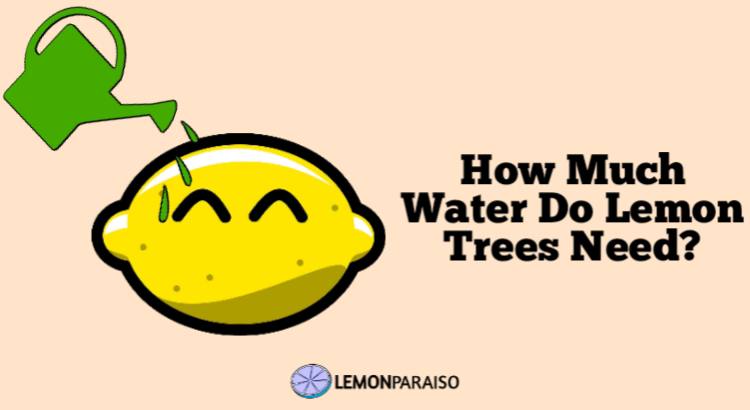How Much Water Do Lemon Trees Need?

Lemon trees are a popular fruit tree that requires regular watering to thrive and produce a bountiful crop of juicy, flavorful fruits. However, it can be difficult to determine exactly how much water lemon trees need, as their requirements can vary depending on a variety of factors such as climate, soil type, and tree age.
Giving lemon trees too little water can result in stunted growth and poor fruit quality, while overwatering can lead to root rot and other issues.
How Often Should You Water A Lemon Tree?
The frequency of watering a lemon tree depends on various factors such as soil type, weather conditions, and the tree’s age. Generally, younger trees require more frequent watering, about once or twice a week, while mature trees can be watered every 10 to 14 days.
During hot and dry weather, the tree may need more frequent watering, while in cooler or wet conditions, you can reduce the frequency. It’s essential to monitor the soil moisture and adjust your watering schedule accordingly to ensure the lemon tree stays healthy and productive.
How Much Water Do Lemon Trees Need Per Day?
It’s difficult to determine a specific amount of water a lemon tree needs daily because the water requirements vary based on the tree’s age, size, and environmental factors.
A general rule of thumb is to provide enough water to thoroughly saturate the root zone, about 1 to 1.5 inches of water per week for young trees and 2 to 3 inches for mature trees.
Make sure to water deeply and infrequently, as shallow, frequent watering can lead to weak root systems and reduce the tree’s drought tolerance.
Can You Overwater A Lemon Tree?
No, overwatering a lemon tree can lead to various problems such as root rot, yellowing leaves, and reduced fruit production. Lemon trees prefer well-draining soil, and excess water can cause the roots to suffocate due to a lack of oxygen.
To avoid overwatering, ensure that the soil has adequate drainage and allow the soil to dry slightly between waterings. Monitor the tree’s overall health and appearance, and adjust your watering schedule if you notice signs of overwatering.
What Is The Best Time Of Day To Water Lemon Trees?
The optimal time to water lemon trees is during the early morning or late afternoon when temperatures are cooler, and the sun is less intense. Watering at these times reduces water evaporation and allows the tree to absorb water more efficiently.
Morning watering is preferred because it allows the moisture to dry from the foliage throughout the day, reducing the risk of fungal diseases. Avoid watering in the late evening or at night, as standing water can promote the growth of fungi and other pathogens.
How Do You Know If A Lemon Tree Needs Water?
To determine if a lemon tree needs water, check the soil moisture by inserting your finger about 2 to 3 inches into the soil near the tree’s base. If the soil feels dry at that depth, it’s time to water the tree.
Another indicator is the appearance of the leaves; if they are wilting, curling, or turning yellow, it may be a sign that the tree is not receiving enough water. Additionally, monitor the tree’s growth and fruit production, as stunted growth and reduced fruit yield can also indicate insufficient watering.
How Much Water Does A Mature Lemon Tree Need?
A mature lemon tree typically requires around 2 to 3 inches of water per week, depending on factors like climate, soil type, and tree size. It’s essential to water deeply and less frequently to encourage a strong and healthy root system.
During periods of drought or extreme heat, the tree may require additional water to prevent stress and maintain productivity. Keep an eye on the soil moisture, and adjust your watering schedule as needed to ensure the tree remains healthy.
How Much Water Does A Potted Lemon Tree Need?
Potted lemon trees generally require more frequent watering compared to those planted in the ground due to their limited root space and faster soil drying. Water your potted lemon tree when the top 1 to 2 inches of soil feels dry, which may be every few days or once a week, depending on the pot size, soil type, and environmental conditions.
Ensure the pot has proper drainage holes to prevent waterlogging and root rot, and use a well-draining soil mix to promote healthy root development. Monitor the tree’s overall health and appearance, adjusting your watering schedule if necessary to maintain optimal growth and fruit production.
How Much Water Does A Lemon Tree Need In Summer?
During the summer months, lemon trees typically require more water due to increased evaporation and higher temperatures. You may need to water young trees every 3 to 4 days and mature trees every 7 to 10 days, providing approximately 1.5 to 2 inches of water per week for young trees and 3 to 4 inches per week for mature trees.
Keep a close eye on the soil moisture and the tree’s overall health, adjusting your watering schedule as needed to ensure the tree remains well-hydrated and healthy throughout the summer months.
How Much Water Does A Lemon Tree Need In Winter?
Lemon trees generally require less water during the winter months due to lower temperatures and reduced evaporation. Water young trees every 2 to 3 weeks and mature trees every 3 to 4 weeks, providing around 1 to 1.5 inches of water per week for young trees and 2 inches per week for mature trees.
Monitor the soil moisture and the tree’s overall health, adjusting your watering schedule if necessary to ensure the tree remains hydrated and healthy throughout the winter season.
How Much Water Does A Lemon Tree Need In A Drought?
During a drought, lemon trees may require additional water to prevent stress and maintain productivity. Young trees are more susceptible to drought stress and may need watering every 2 to 3 days, while mature trees may require watering every 5 to 7 days.
Provide around 2 inches of water per week for young trees and 3 to 4 inches per week for mature trees during drought conditions. To conserve water and reduce evaporation, consider using mulch around the base of the tree and implementing drip irrigation systems for more efficient water delivery.


